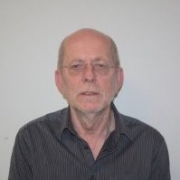
Tutorial document sheet and book for an examination with blurred highlight color and Thai text.
The first of a new series on the blog, this month we spoke to John Slaght about his career in education. Many thanks to John for answering our questions!
You have worked in education for almost 50 years. How has language assessment changed over that time?
When I first began we produced handwritten tests using a Banda machine. This in itself should indicate some idea of how language assessment has evolved. The design of language assessment underwent a major change with the introduction of the communicative approach to language learning. I was fortunate to have Keith Johnson as my MA in Applied Linguistics personal tutor when I went back to university in 1988. I also had contact with Keith Morrow.
How did you get into EAP?
As a result of my MA. At the end of the course, I was recruited to teach on the summer pre-sessional (1988). I returned every summer for 10 years, meanwhile teaching EAP at Padworth International 6th Form College during the rest of the year.
What are the biggest challenges for those working in language assessment?
There is a great deal to learn. Acquiring statistical knowledge was my biggest challenge as it doesn’t come naturally to me. In general, however, I would say it’s having, or at least acquiring, a thick skin and facing up to the fact that language tests have to be as perfect as they can possibly be. If it a test you are working on is not good enough you have to accept this, fix it or walk away.
What advice would you give to students revising for English assessments?
Learn from the course content. Do not waste too much time going over practice tests. Go over your written work and while doing this look at your mistakes and learn from them. Read as much in English as you can in order to acquire and cement your lexical and grammatical knowledge in the most authentic way possible.
Can you tell us something about test writing that people may find surprising?
All language tests are essentially artificial; we can only strive to make them as authentic as possible.
What are you currently working on?
Fluency. This is a much misunderstood term both in speaking and in writing. If I were to ask 5 people in a room to write down their definition of spoken fluency, I would probably get back 5 different responses. I’m currently engaged in a research project looking into spoken fluency which I hope will have ramifications across the field of assessment no matter what the target language is.
What does the future look like for EAP?
It needs to adapt to the world of technology. This opens up new avenues.

What is your motto?
You’ll only know you can do it if you try.
What is your favourite English word or idiom?
Pandemonium.
Which living person do you most admire?
Ros Richards, lately retired ISLI (International Study and Language Institute) Head of School.
What did you want to be when you were growing up?
Until I was about 10, a cowboy; until now, as I’m still growing, the best I can at whatever I’m doing.
Which book have you read recently that you’d recommend to everyone?
The Penguin Lessons by Tom Michell.
What fact about you might people who know you not be aware of?
I’m stone deaf in my right ear, which is why I’m always manoeuvring people on to my left side.



